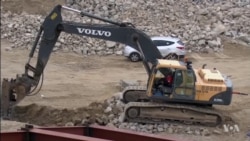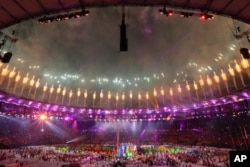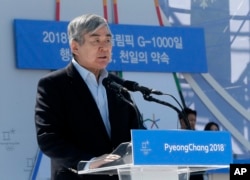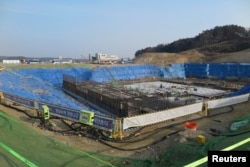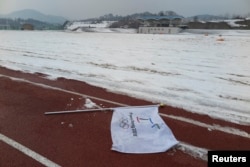With the Rio Olympics over, the countdown to the Pyeongchang winter games begins.
But the organizers of the Olympics to be held in South Korea in 2018, are working to avoid the delays and organizational criticisms that plagued the Rio games, while also trying to avoid the bloated budget of the 2014 Sochi Olympics.
The Pyeongchang Organizing Committee for the 2018 Olympic and Paralympic Winter Games (POCOG) estimates the games will cost $12 billion, which is more than the $4 billion to $6 billion spent in Rio, but far less than the over $50 billion the Russians paid to host the Sochi Olympics.
Blame it on Rio
Brazil’s economic problems caused to funding shortfalls that led to projects being completed late or unfinished. A week before the start of the games, Australian officials complained their new housing units were uninhabitable with blocked toilets, leaking pipes and exposed wiring.
Various problems led to the perception that Brazil was not adequately prepared to host the highly complex and high profile international event.
The problems encountered in Rio have taught the Pyeongchang organizers that they need to complete their Olympic venues and related infrastructure improvements well in advance of the games to work out unforeseen difficulties.
“We are making an effort to ensure the Pyeongchang Olympics will be progressive and successful by having learned from Rio as a reference, ” said Yeo Hyung-koo, the Secretary General, of the POCOG.
All the 12 sports venues in South Korea are on track to be completed by September of 2017, and organizers plan to hold test events prior to the games to anticipate and correct any technical and logistical problems.
75/25 Split
Highway expansion projects and a new high-speed rail system account for nearly the entire Olympic budget. A bullet train service is scheduled to begin operation in June of 2017, cutting the time to travel the 120 kilometers between Seoul and the western mountain region from four hours to one.
The South Korean central government is also paying for the infrastructure improvement and contributing 75 percent of the costs for the sports stadiums.
The Gangwon Province government, which includes Pyeongchang County, will cover the remaining 25 percent of the costs for the venues. After the games, the provincial government will own the new skating rinks, bob sledding track and skiing facilities, and potentially operate them to generate revenue.
Plans for post-Olympics use for 10 of the 12 venues have already been decided.
“These venues will be used for professional sports facilities, hockey rinks, educational facilities, sports and cultural events and exhibitions,” said Byeon Jeong-kwon, the Gangwon provincial manager for the Pyeongchang Winter Olympics.
Mountain cluster
The Alpensia ski resort in Pyeongchang will be the central hub of the Olympics, with media centers located there, lodging reserved for high-ranking officials and sponsors, and most of the skiing events will be held close by.
The ski jump tower, which can be seen from the resort, was built in 2009 and has already hosted International Ski Federation competitions.
The Olympic stadium for the opening and closing ceremony is a short bus ride from the resort. Currently under construction, the site will also host exhibits by corporate sponsors during the games.
Environmental flip flop
The Jeongseon Alpine Center downhill ski race course was carved out of protected forestland on Gariwang Mountain, about 30 minutes away from the main cluster of outdoor events.
Gariwang Mountain is the only site in the region that is tall and steep enough for Alpine skiing competitions, with a vertical drop of 800 to 1,100 meters.
The Gangwon provincial government approved the project over the objections of environmentalists and initially assured the public that the forest would be restored after the games.
However, officials are now saying it has not yet been decided what to do with the ski slope on Gariwang Mountain.
“Through close cooperation with experts on after-use and related organizations, we are planning to prepare measures for after the games,” said Gangwon provincial manager Byeon Jeong-kwon.
Coastal cluster
The Pyeongchang organizers opted not to build new housing projects, as was done in Rio. It did not seem viable given the small population in the mountain region.
But that means many of participants and spectators will have to stay 40 kilometers west in Gangneung, a coastal city of 200,000 that will also host the ice skating events on five new ice rinks that are being built for the games.
Olympic spirit
The surrounding towns and neighborhoods near the Olympic venues themselves are a nondescript working class areas and not tourist destinations that will likely attract many international visitors.
Some Pyeongchang residents are not enthusiastic about hosting the winter games. There are complaints about traffic jams caused by the construction, concerns that taxes will go up to pay for the games, and some are some are complaining of increased rents due to the influx of workers into the region.
“We are not satisfied as our spending is more than what we earn,” said Choi Jong-gu, a taxi driver in Pyeongchang.
The South Korean organizers are just beginning to publicize the winter Olympics that are less than a year and a half away.
The visitor center in Gangneung is one of the few Olympic attractions open to the public. It brings in hundreds of people daily who come to learn about the events, experience virtual Olympic competitions and try their hand at indoor curling.
“The winter Olympics are not popular in Asia. That’s why this is really important for us to promote this,” said Jeong Ji-Young, who is part of Pyeongchang’s Public Engagement Team.
The Pyeongchang Olympics will surely feature South Korean high-tech innovation exhibits and modern K-pop music.
But international visitors who need a break from the Olympic buzz can also explore Korea’s ancient culture by visiting the 642-year-old Woljeongsa Buddhist temple and practice quiet meditation in the mountain retreat.
Security
The South Korean crime rate, especially compared to Rio, and the threat of terrorism is low.
The Zika virus in South Korea has been contained to a few cases of individuals who were infected while traveling to tropical countries, but last year there was an outbreak of the Middle East Respiratory Syndrome (MERS.)
The potential for a North Korean provocation poses the most significant security risk during the games, but organizers hold out hope that leader Kim Jong Un will agree to participate rather than disrupt the 2018 winter Olympics.
Youmi Kim in Seoul contributed to this report.




